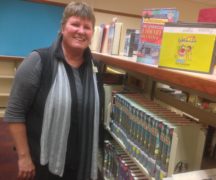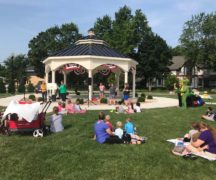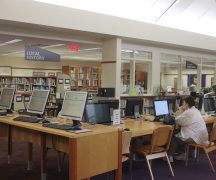By DAVID DUPONT
BG Independent News
A global pandemic is not usually a factor when a tax-funded entity considers the type, amount and duration of a tax levy.
That was on the minds of the members of the Wood County District Public Library Board when they met last week. And that wasn’t the only uncertainty.
“The board is facing “a lot of unknowns and crazy variables,” said Brian Paskvan, the president of the board.
After extensive discussion, the board sought safety in the familiar by voting to take the first step to place a renewal of its 0.8 mil levy for six years on the November ballot. That’s what 70-percent voters approved in 2014. The levy generates just over $1 million a year.
Among those variables is a lawsuit brought by landowners to extricate some rural townships from the Bowling Green City School District. If successful, that would also affect the funding for the library. Library Director Michael Penrod noted that the landowners who became part of the Otsego or Elmwood districts that would be paying 1 mil for library services, instead of the 0.8 mils now. Those remaining in the library district would see their taxes increase.
This represents, he said, one thread pulled from a tapestry, that will cause more unraveling.
Another uncertainty is the payments from the pipeline. Those paid are already far lower than what was projected by the pipeline companies, and now the companies are appealing even those.
Both Paskvan and Penrod said that the advice all along has been not to count on the money. It should to set aside for one-time projects, Paskvan said.
If those hoping to leave the school district are successful, that would mean the loss of that revenue for the library, Penrod said.
Trustee Chet Marcin said: “My concern is with the economy potentially going into recession.”
Penrod offered the trustees a number of options, including those that would raise the tax rate and extend the time, including making the levy continuing.
The library could make it a replacement levy, which resets the values on which the levy is collected. Now they are based on the values in 2010, when the levy was first passed.
Penrod said the increase would make would not be great and would mean the elimination of the state rollback. That would cost taxpayers $82,000.
Trustee Ken Frisch said that may not seem like a lot, but “there’s the psychological costs. That’s something we need to be cognizance of with all these other moving parts.”
The trustees discussed the possibility of making the levy continuing or extending the term to eight or 10 years.
Penrod said his estimates, based on the expectation that funding from the state will be decreasing and that the pipeline money will not be coming, show the library could live on the current levy for nine and a half years before it needed to seek more revenue.
Trustee Ellen Dalton expressed concern about having to go back for another levy.
Paskvan said that despite warnings that e-books and digital technology would kill libraries, usage and circulation are up, and that takes a toll on the building.
It’s been 17 years since the downtown facility was renovated and expanded. It has an expected life of 25 years, Penrod said.
He said with conservative budgeting the library has accomplished a lot with the revenue from the levy. “We’ve taken this million a year and we’ve done a lot of things.”
That includes doubling the size of Walbridge library, expanding materials, having longer hours, and creating conference rooms on the second floor.
Conservative budgeting has allowed the board to accomplish this and projects like this summer’s $300,000 upgrading of the heating, ventilation, and air conditioning system without borrowing money.
“My main concern,” said trustee Becky Bhaer, “is we keep the voters’ respect and they continue to love their library. I think we have that.”
Trustee Nathan Eikost, from Walbridge, questioned why they wouldn’t go for a continuing levy. “I have no doubt that a continuing at current rate would pass hands down.”
He acknowledged that he wasn’t as familiar with the electoral dynamic in Bowling Green as the other members of the board.
But concern about remaining transparent, and concern about later having to ask for a second levy led to the board sticking to the the tried and true, as they face an uncertain future, in which they don’t know when they will meet face-to-face again.





